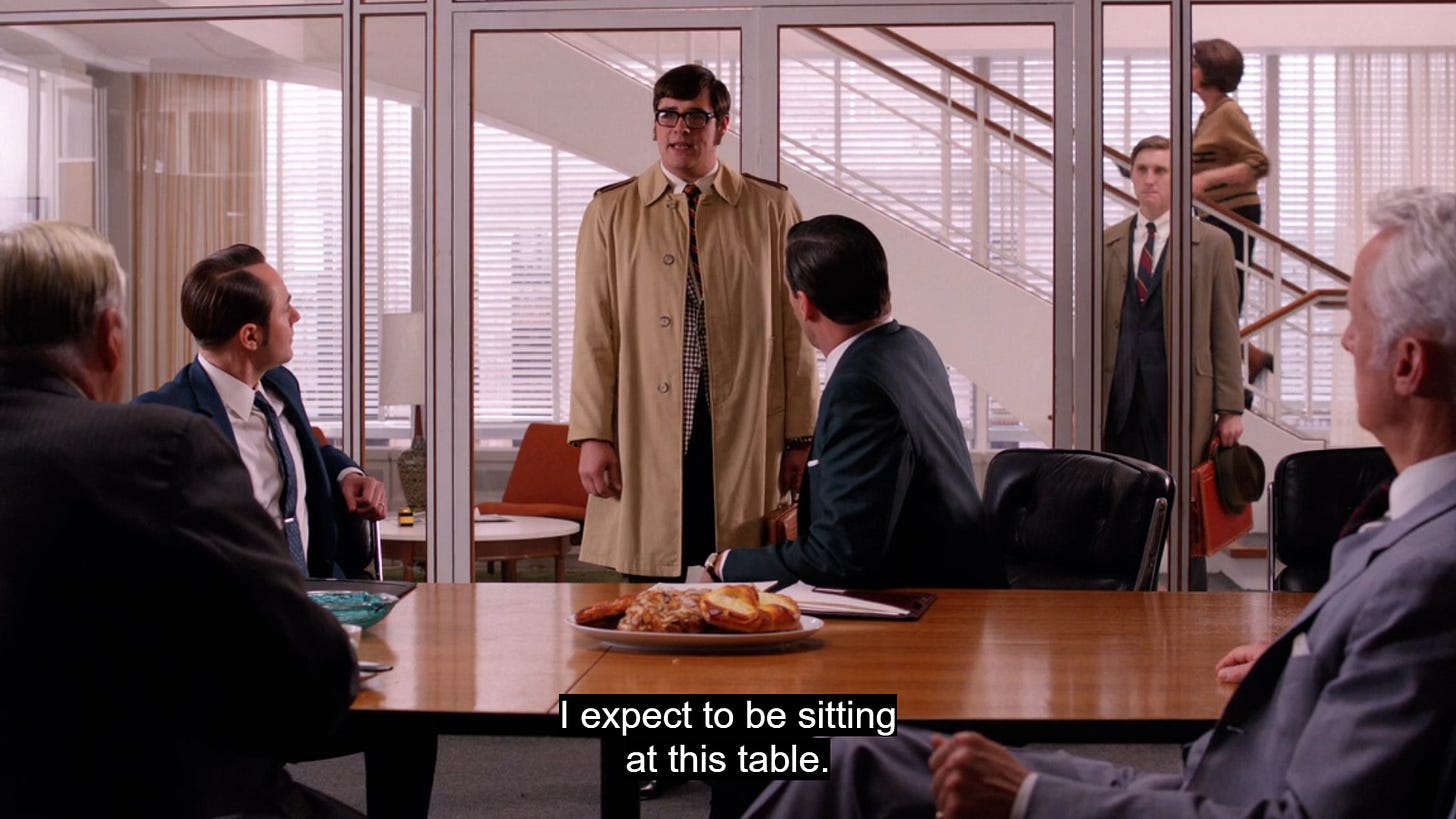Season 6: Episode 4
“To Hand and to Hold”
Written by Erin Levy
Directed by Michael Uppendahl
Setting: March 1968
Mad Men is many things, but I think two central draws bring in viewers.
The escapism of history. Exploring a decade of fashion, music, and world-changing events!
The drama of “SHE’S KISSING WHO?”
“To Have and to Hold” leaves the viewers attracted by the first draw feeling like Joan during her night on the town.
There’s a balance to these two draws. “To Have and to Hold” is mostly about, well, having and holding, but the assassination of Dr. King is right around the corner. Petty drama becomes eclipsed when history stops the nation.
“To Have and to Hold” is effective at showing how meaningless the drama these characters live through is. That drama... has begun to feel like a soap opera.
This is intentional. Soap operas are known for introducing ridiculous new storylines to keep the viewers at home hooked. The issues in this episode are intentionally petty and dumb:
You can’t fire my secretary! She works for me.
You lost my account because you went behind my back!
I don’t like that you’re kissing an actor on a show, even though I am SLEEPING WITH OUR NEIGHBOR AND ASKING HER TO REJECT GOD WHILE I DO SO!
The season will grow more ridiculous as an answer to the tediousness of life. Season 2 is about how nothing ever happens, even when missiles could fly over any minute. By Season 6, bombs are dropping. They’re just thousands of miles away. No one is living in the anxiety of what might happen; they are surviving the despair of what is currently happening.
Now that something is happening, everyone pretends it isn’t. The nation is both tedious and on edge, locked in a pointless war that divides Americans who yearn for the simplicity of what they thought the future would be.
Somehow, even with all of the death and destruction being rained down by Dow Chemical, it feels as if nothing is happening. Existence has become a stalemate. There is no such thing as victory if this is the price that must be paid.

An odd coincidence with the episode is that Episode 4 of Season 5 introduces Dawn’s first B-plot. Now, Episode 4 of Season 6 follows her again.
Season 5’s Dawn story is awkwardly handled and remembered as one of the weaker moments on the show. She then mostly takes a back seat for the rest of the season.
Now, Dawn is given a B-plot where she clocks out for a coworker and takes the high road by owning up to it and requesting punishment for herself.
The storyline isn’t interesting enough to have so little focus. It would be far more interesting if Dawn had more focus. It just comes off feeling like “we haven’t done a Dawn story in a while,” which is unfortunate.
Dawn has never been afforded the same opportunity to grow as fellow new faces like Stan or Ginsberg. The reality of being a woman of color working at an all-white agency is that she faces racism, but there is so much more to her storyline. Dawn and a friend get dinner twice and discuss her frustrations trying to find a boyfriend. With Dawn, there is so much talk about what she wishes would happen. The viewer is left anticipating some actual change.
Dawn always should have had a larger storyline. More scenes with Don! More interaction with both the drama and history that define Mad Men! Why doesn’t the show give us this?
Instead, it’s more important that we show Don and Megan unknowingly getting dinner with swingers... I guess?
The central premise of Season 6 is that when life gets boring, insanity is injected by the sane. The mundane problems Dawn’s white coworkers face are given so much more focus and eventually explode out of control.
The premise works because we aren’t tuning in each week to see a piano fall on Pete Campbell just for it to be revealed that that was his twin brother.
We aren’t tuning for insanity.
The viewer watches Mad Men in the hope of normalcy.
Mad Men can never be a soap opera because we all hope things will turn out okay. Even though we know the future that is coming, each episode begins with hope.
Don will fix this.
Pete will apologize.
Dawn will be given her chance.
Insanity makes us laugh and brings us in, but hope keeps us there.

Throughout the insanity and dread of 1968, hope remained.
That hope remains with us today to learn from and celebrate. No matter how dark the world, there’s always a chance to do better.











Great writeup! I’ve appreciated how you’ve drawn out the show’s thematic links to the capital H History happening concurrently with its events. One note on this episode: CGC also fails to win Heinz. That’s why they’re at the bar (the “lonely hearts club”) with SCDP: “J Walter Thompson, bought it in the room.” That parallel failure prefigures Don and Ted’s conversation about big vs small agencies before the Chevy pitch.